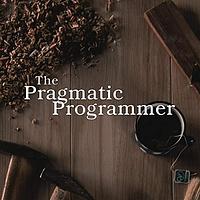Take a photo of a barcode or cover
226 reviews for:
The Pragmatic Programmer: 20th Anniversary Edition, 2nd Edition
David Thomas, Andrew Hunt
226 reviews for:
The Pragmatic Programmer: 20th Anniversary Edition, 2nd Edition
David Thomas, Andrew Hunt
Chapters Read:
1 A Pragmatic Philosophy
2 A Pragmatic Approach
3 Basic Tools
4 Pragmatic Paranoia
5 Bend, or Break
6 While You Are Coding
7 Before the project
8 Pragmatic projects
1 A Pragmatic Philosophy
2 A Pragmatic Approach
3 Basic Tools
4 Pragmatic Paranoia
5 Bend, or Break
6 While You Are Coding
7 Before the project
8 Pragmatic projects
A little out of date, but given that it was published in 2000, much of it was still surprisingly relevant. The example exercises were in Java and C, which made them a bit hard to follow, since I don't currently work in either of those languages. But, good programming guidelines all around.
Good book, if a bit dated. Should be taught in all compsci programs.
While I may not agree to practice everything included in this book, it's going to become one of those that sits on my shelf, at the ready, when I need to call back to it for something.
I've been in the software industry for a few years now and luckily have had a pretty good team and organization that follows a lot of the practices and ideas mentioned in this book (which means I also have gotten the opportunity to learn and implement them, as well), but there were a lot of high level overviews that brought a bit more of a "whole picture" philosophy to my attention. This was great for me to put a bit more of my own mental fortification and structure into those aforementioned practices and ideas.
Overall very useful book that I would recommend for anyone. Whether you're just starting out or have been working here for some time, this book goes over product and project philosophy, testing strategies and practices, a bit of architecture and paradigms like mixins, distributed systems and class inheritance, some different algorithmic approaches, and more. It doesn't go very deep into any of these, but it's a great tour of things to think about and you can use it as a good jumping off to pick out some areas you'd like to explore more deeply.
Overall very useful book that I would recommend for anyone. Whether you're just starting out or have been working here for some time, this book goes over product and project philosophy, testing strategies and practices, a bit of architecture and paradigms like mixins, distributed systems and class inheritance, some different algorithmic approaches, and more. It doesn't go very deep into any of these, but it's a great tour of things to think about and you can use it as a good jumping off to pick out some areas you'd like to explore more deeply.
IT галузь розвивається настільки стрімко, що навіть добра книга може стати застарілою всього за кілька років. Власне, це той випадок. Це скоріше набір 100 корисних порад для початківця-інженера, що прибув з безлюдного острова. Для сучасного ж айтівця, вона може здатися простою і нудною. Тут ми бачимо багато очевидних порад, таких як користуватись гітом, писати тести, спілкуватись з командою. Мова авторів досить складна, є переклади технічних термінів (про що автори попереджають на початку), часом мова абстрактна або занадто формальна. Автори використовують приклади з різних мов програмування: Eiffel, Elixir, Lisp, Bash, Python, що з одного боку цікаво, а з іншого - часто код просто прокручується. Приємною родзинкою стали кілька анекдотів та низка фанових прикладів.
Починається з теми "Філософія прагматизму", і це можливо єдина цікава частина, в основному книга дещо нудна. Ключова порада, яку я для себе тут знайшов - завжди мати при собі щось для читання, якусь кишенькову книгу, це гарна ідея. Надмірне прикрашання продукту може навіть зіпсувати його, як за мазками художника може зникнути сама картина. Влучний час влучній темі. Розширюйте контекст. Використовуйте фіча-флаги.
Я можу рекомендувати книгу скоріше через її структуру аніж за якість вмісту. Короткі глави, які можна прочитати під час короткої перерви від комп'ютера, ідеально підходять на заміну думскролінгу соціальних мереж або мобільних ігор.
Як висновок, наведу найважливішу пораду книги за версією її авторів: "У вас є свобода вибору", що можна доповнити словами Мартіна Фаулера - "Якщо вам щось не подобається, змініть організацію, або змініть свою організацію"
Починається з теми "Філософія прагматизму", і це можливо єдина цікава частина, в основному книга дещо нудна. Ключова порада, яку я для себе тут знайшов - завжди мати при собі щось для читання, якусь кишенькову книгу, це гарна ідея. Надмірне прикрашання продукту може навіть зіпсувати його, як за мазками художника може зникнути сама картина. Влучний час влучній темі. Розширюйте контекст. Використовуйте фіча-флаги.
Я можу рекомендувати книгу скоріше через її структуру аніж за якість вмісту. Короткі глави, які можна прочитати під час короткої перерви від комп'ютера, ідеально підходять на заміну думскролінгу соціальних мереж або мобільних ігор.
Як висновок, наведу найважливішу пораду книги за версією її авторів: "У вас є свобода вибору", що можна доповнити словами Мартіна Фаулера - "Якщо вам щось не подобається, змініть організацію, або змініть свою організацію"
informative
slow-paced
Despite rave reviews, I found this book to be a manual of common sense for life in general. Own up to your mistakes, work well on teams, etc - all good advice. A nice read but maybe not unique or groundbreaking?
Classic book on programming / engineering patterns and approaches. Easy to read and the updated version is still relevant with updated examples on modern languages



